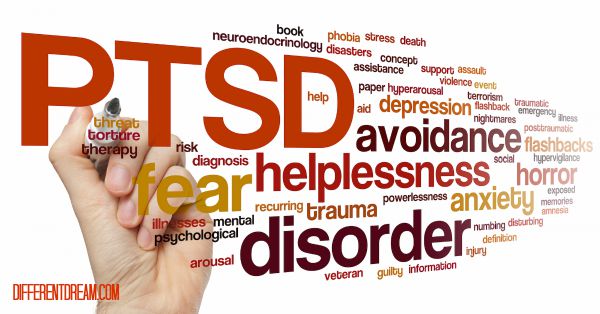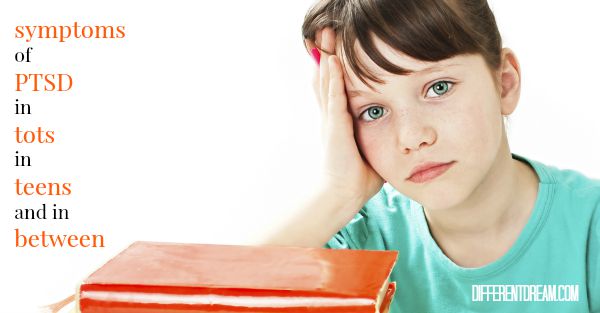Special Needs Parenting Stress and Medication

Thank you for stopping by Different Dream today. June is Post-Traumatic Stress Disorder (PTSD) Awareness Month, and almost every Different Dream post in June deals with some aspect of this pervasive mental illness. Today, guest blogger Sheri Dacon brings up something few parents willingly discuss: when parents dealing with the stress of raising kids with special needs should consider medication for themselves.
Special Needs Parenting Stress, and Medication
It’s a hot enough topic talking about medications for our kids. But to discuss medications for ourselves—the parents—well, it’s a conversation we’d rather avoid.
Nonetheless, it’s something we must address. The stress level special needs parents experience on a daily basis is not the norm. It’s a far heavier load than the average parent bears. One study equates the stress levels of special needs moms to that of combat soldiers.
It’s that kind of stress that completely blindsided me.
I’ve always been independent, a hard worker. I believed there was nothing I couldn’t handle if I set my mind to it. With grit and determination, I could accomplish anything.
Well, I was wrong.
When You’re Drowning in Stress
Dealing with autism increased my workload exponentially and took “mommy guilt” to a whole new level.
- There was more driving–to therapy sessions and doctor appointments, to schools and social skills camps.
- There was more paperwork to file and keep track of.
- There were appointments to be made, phone calls to make, books to read, meetings to attend, and so much to learn.
- There were diets and supplements to try, behavioral strategies to implement, schedules and charts to create, screens to monitor, sleep schedules to regulate, basic life skills to teach.
And there was very little support.
I was one of the lucky few blessed with supportive family and teachers. But I had few friends who understood what I was going through, and no one to talk to about the difficulty of managing my day to day.
It felt like drowning.
I loved my child—all my children. But I was so depleted emotionally, physically, and spiritually that I had trouble expressing anything other than frustration, anger, and sadness.
It was time for some intervention.
The biggest mistake I made? Waiting too long.
False pride convinced me I could handle everything alone. As a result, I ended up in an emotional pit I couldn’t climb out of on my own, no matter how hard I tried.
It was anger that finally sent me to my doctor, and it’s not surprising. Anger is a secondary emotion. It’s a signal on the dashboard, a warning that something’s wrong under the hood.
My anger pointed to a deep-seated problem with anxiety. Because I didn’t have control over my life, I was consumed by worry, fear, and hopelessness. My body responded the way an anxious body always does. I couldn’t relax, I was noticeably tense throughout my shoulders, neck and back, and my breathing was shallow. I couldn’t make it through a day without some sort of emotional explosion or meltdown.
Special Needs Parenting Stress and Medication
The doctor listened to my descriptions and diagnosed me with anxiety. He then prescribed an SSRI as well as a prescription for Xanax, to be used as needed for warding off panic attacks.
Let me just say a word about antidepressants and anti-anxiety medications. I’d taken them before, but had become leary of them. I’d bought into the religious ideology that mistakenly claims these drugs are unnecessary at best, and a total lack of faith in God at worst. I had the legalistic notion that if I just improved my spiritual life by doing all the right Christian things, then I could overcome any depression or anxiety on my own.
I was afraid of using medication as a crutch to avoid the deeper spiritual and emotional problems.
To be fair, this can be a problem with prescription medications. Sometimes they’re used as band-aids to cover up symptoms rather than address heart problems.
But there are times when both medication and deeper emotional work are needed.
And special needs parenting often falls into that category.
Having to take medications just to cope with ordinary days made me feel weak. I felt like a failure. Until I learned that most special needs parents end up having to take prescription medications for exactly the same reasons.
The human body and mind can only handle so much stress.
Sure, we recognize the importance of self-care to alleviate stress. Problem is, self care regimens aren’t easily acquired by special needs parents.
- If our kids don’t sleep well, or if they require round the clock care, we don’t sleep well.
- We’d like to exercise or get out of the house more, but it’s likely our special needs child requires constant supervision.
- We’d love an hour or two of respite, but without family or friends nearby whom we can trust, or a local respite program willing to accept our child, the opportunity for a few hours off eludes us.
Seeking help through prescription medication is more often than not, a necessary part of the solution.
I’ve been on anti-anxiety meds for several years now and can tell you this: medication takes the edge off of my stress. It doesn’t remove it altogether. It doesn’t keep me from having meltdowns or panic attacks. But it makes both more rare. It helps me to stay at a more even keel for longer periods of time.
In short, prescription medications help me to parent all my children better. Medication helps me to feel more like myself, to keep my emotions within a healthy range, and to think more rationally when stress tries to get the better of me.
A Word of Encouragement
If you’re a special needs parent, you’re dealing with stress, too. It comes with the territory.
So may I offer a word of encouragement from a parent who’s been there?
Don’t wait too long. Don’t wait until your stress levels reach dangerous levels.
- Do your research.
- Look to reputable sources for information.
- Talk to your significant other or a trusted friend.
- Contact a health professional and discuss your options.
And don’t rule out prescription medications. They might just be the lifeline you need to help keep your head above water.
You aren’t alone in this, you know.
What’s your take on special needs parenting stress and medication?
What would you add to Sheri’s take on special needs parenting stress and medication? Everyone at Different Dream would love to hear what you have to add to the conversation.
By Sheri Dacon
You can learn more about Sheri by visiting her website at sheridacon.com.
1 Comment
Trackbacks/Pingbacks
- Special Needs Parenting, Stress, and Medication - Sheri Dacon - […] over at Different Dream today talking about special needs parenting, stress, and medication. Won’t you join me over […]
Submit a Comment
Subscribe for Updates from Jolene
Related Posts
Why and How Childhood PTSD Is Often Misdiagnosed
This post examines factors that make an accurate diagnosis of childhood PTSD difficult. It also lists tips for getting the right diagnosis.
Childhood PTSD Symptoms in Tots, Teens, and In Between
Symptoms of childhood PTSD vary according to age. This post examines symptoms of PTSD in these age categories: birth to 3, 4 to 6, 7 to 12, and 13 to 18.
Why the Spotlight Is on PTSD in Children
What happened between 1982 & 2008 that moved awareness of PTSD in children into the spotlight? This post explains 4 breakthroughs that moved the field ahead.






Hi Sheri, great to come across your article. Been thinking of trying some natural supplements (L-theanine, etc) for this very reason, although some meds give me migraines which I’m prone to. My 22-yr old son has low-functioning autism, ocd, and Type 1 diabetes (which itself is Very complicated and involved). Constant state of anxiety here, guess it’s time to treat this. Thx